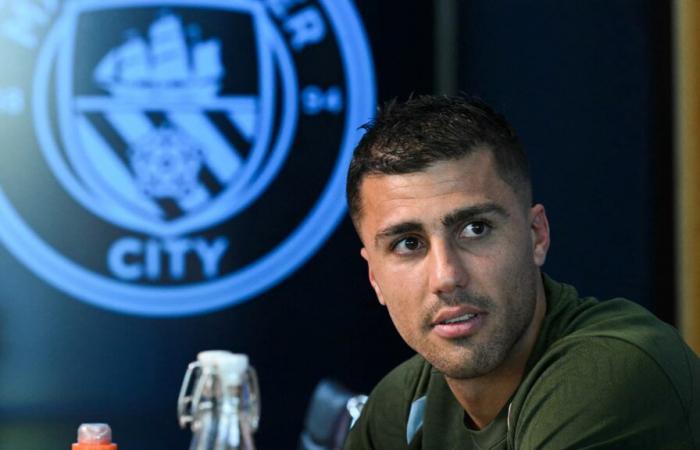Manchester City midfielder Rodri said on Tuesday, September 17, that professional players were “close” to starting a social movement in the face of the increase in matches and competitions. But is this really credible?
The idea took root and germinated slowly. It became more pressing in May, when FIFA presented the new version of its Club World Cup, now set to take place in the summer. Then it found itself at the heart of the news this week when the Champions League resumed, a competition that also has a new face, with a heavier schedule.
Could professional footballers go on strike to protest the infernal pace of play? “Yes, I think we are close to it,” said Rodri on Tuesday, September 17, on the eve of Manchester City-Inter. “If you ask any player, they will tell you. It is a general opinion among the players, it is not just Rodri’s opinion.” Dani Carvajal, Alisson Becker, Marquinhos: many players have spoken out in recent days.
The players will end up having “no other choice”, believes the Spanish European champion, “if it continues like this”. “But I don’t know what will happen. In any case, it is something that worries us because we are the ones who suffer”, he insists.
Cadences, not just the business of “top players”
However unusual his status may be, a professional footballer can go on strike, just like any employee. On the one hand, this right is protected by the Convention on Human Rights, a text from the Council of Europe. On the other hand, “all the Member States of the European Union have signed the Convention on Freedom of Association and Protection of the Right to Organise of 1948, from the International Labour Organisation”, recalls Tout l’Europe, the reference site on European issues. The contours of this right can however vary from one country to another, with more or less strict supervision.
Ultra-competitive and individualistic, the football world offers short careers where money is more than anywhere else the sinews of war. It is not, a priori, the most conducive breeding ground for social movements. And yet, the strike could be a way for players to make their grievances heard in the face of a “cannibalized calendar”, according to Fifpro, the union defending their interests.
“We realised that it didn’t just concern top players. We realised that it had an impact on football,” points out David Terrier, president of the European branch of the union and vice-president of the UNFP, the organisation which defends players playing in France.
Beyond the highest paid players, engaged in continental competitions, other internationals play in smaller teams or in lower divisions and make the flights to represent their country on the other side of the world.
On our channel, David Terrier cites the striking example of Saliou Ciss. Returning victorious but exhausted from the CAN 2022, the Senegalese defender was unable to prevent Nancy’s relegation to the National… and never found a place to fall back on. He announced that he was ending his career at the beginning of September.
“Doctors and team performers tell us: after 55 matches per season, a player begins to expose himself more to injuries and his physical level, potentially, drops,” says David Terrier, guest on After Foot on Monday.
Guest: David Terrier, Vice-President of the UNFP / Part 3 (LFP elections, Panini affair, role of the union, infernal pace in football, Trophies…) – 16/09
Economic health rather than players’ health?
“The clubs, their interest is not the health of the players. It’s economic health,” Morgan Schneirderlin, former French international, coldly explains to RMC. According to the former Mancunian, it is also “the mental health of the players” which is “put to the test”.
From then on, the Alsatian believes that “the players are starting to protest”. But he fears the reaction of their employer. “Rodri said: we might go on strike. He will go to the club and the club will tell him: you go on strike, we will lose 20% of our income if you don’t play so many and so many matches. Give us your contract and we will take 20% off you. It will be a difficult journey”, he anticipates.
At the level of Ligue 1 and Ligue 2, “it is difficult to find compromises through social dialogue. I denounce it: it does not exist. We cannot discuss. We are not making any progress in France”, underlines David Terrier.
The role of the coach in rotation
In a context of increasing number of matches, Morgan Schneiderlin affirms that “the role of the coach will be more and more important”. And the former midfielder illustrates his point: “I am Manchester City. I have a group of 25 players. Rodri, you know what? You will be on the bench, take three days with your family”.
On the Inter bench, Simone Inzaghi is forced to adapt. “We know that there are many games and we, the coaches, are aware of this. I can say that preparing these games for a coach is beautiful and exciting, we know that television is one of the reasons why we earn a lot of money. (…) We know that we started the preparation in July and that we will finish the season at the end of July with the Club World Cup,” said the coach at the head of Inter on the eve of the match against Manchester City.
Aware of the “problems” caused by the calendar, the Italian knows that he “will have to alternate as many players as possible”. “Today there are no Dimarco and Arnautovic, but for two years we have been used to having sometimes limited rotations”, he regrets.
“If the organisers who decide don’t imagine that the players are going to get injured because they play too much, then we have a problem,” warns Carlo Ancelotti, Real Madrid coach. “I would like them to reduce the number of matches to have more attractive competitions.”
A complaint from Fifpro
According to David Terrier, the pace is already having an effect on the quality of matches. “There are European coaches, at the highest level, who are implementing strategies that put maximum intensity in the first half to try to lead 1, 2 or even 3-0 to make a pass to ten behind in the second half.”
“We are killing football,” warns the man who will soon be running for the head of the UNFP. “We have to regulate this.”
In this sense, Fifpro filed a complaint against FIFA this summer before the High Court of Brussels, in the hope that it will refer the matter to the Court of Justice of the European Union. Another procedure, brought by “the leagues and club unions”, has also been orchestrated, specifies David Terrier.
In detail, these complaints aim to challenge “the legality of FIFA’s decisions to unilaterally set the calendar of international matches and, in particular, the decision to create and schedule the Club World Cup”.
In a humorous tone, Manuel Akanji once suggested early retirement, at 30, to protect his body. “It’s very hard,” stressed the Swiss international from Manchester City. “You don’t just think about this season, but also the next one. Let’s say we win the league or the cup, then we go to the Club World Cup final; the Community Shield is three weeks later. When will we have a holiday?”






